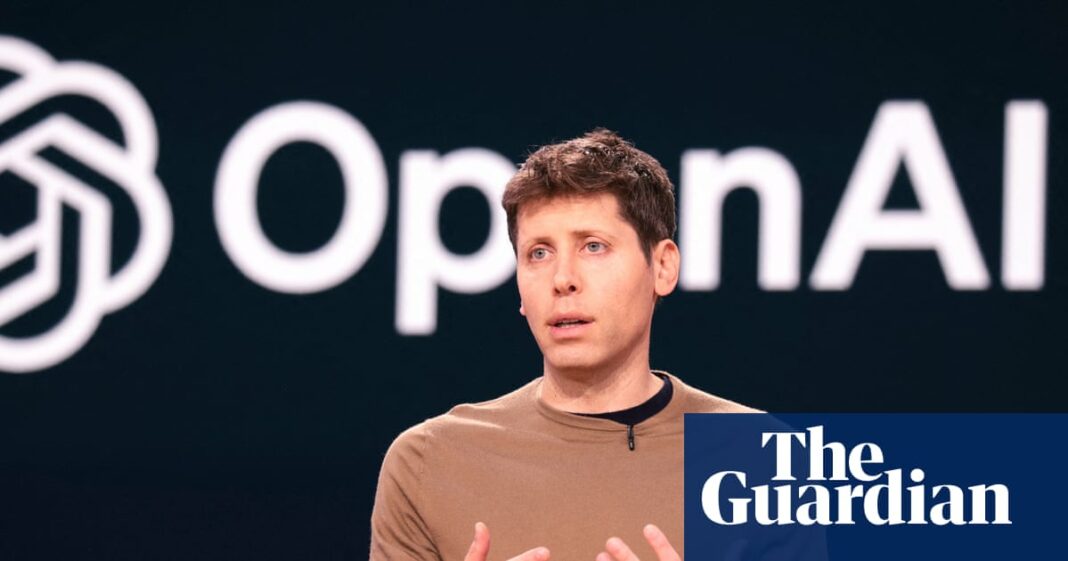The boss of the firm behind ChatGPT and the UK technology secretary discussed a multibillion-pound deal to give the entire country premium access to the AI tool, the Guardian has learned.
Sam Altman, a co-founder of OpenAI, talked to Peter Kyle about a potential agreement to give UK residents access to its advanced product.
According to two sources with direct knowledge of the meeting, the idea was floated as part of a broader discussion in San Francisco about opportunities for collaboration between OpenAI and the UK.
Those close to the discussion say Kyle never really took the idea seriously, not least because it could have cost as much as £2bn. But the talks show the enthusiasm with which the technology secretary has embraced the artificial intelligence sector, despite concerns over the accuracy of some chatbot responses and implications for privacy and copyright.
OpenAI offers free and subscription versions of ChatGPT. The paid version, ChatGPT Plus, costs $20 a month and gives users faster response times and priority access to new features.
Kyle dined with Altman in March and April, according to transparency data released by the UK government. In July, Kyle signed an agreement with OpenAI to use AI in the UK’s public services. The non-binding deal could give OpenAI access to government data and lead to its software being used in education, defence, security and the justice system.
Kyle has been a vocal champion of AI within government and has also embraced its use in his own role. In March, it emerged that he had asked ChatGPT for advice on a range of work-related questions, including why British businesses were not adopting AI and what podcasts he should appear on.
The minister told PoliticsHome in January: “ChatGPT is fantastically good, and where there are things that you really struggle to understand in depth, ChatGPT can be a very good tutor for it.”
The UK is one of OpenAI’s top five markets for paid ChatGPT subscriptions. An OpenAI spokesperson said: “Millions of Brits are already using ChatGPT every day for free. In July, we signed an MoU (a memorandum of understanding) with the government to explore how we can best support the growth of AI in the UK, for the UK.
“In line with the government’s vision of using this technology to unlock economic opportunity for everyday people, our shared goal is to democratise access to AI. The more people who can use it, the more widely its benefits will spread.”
The company has been in talks with several governments in recent months and has agreed a deal with the United Arab Emirates to “enable ChatGPT nationwide” and use the technology in public sectors including transport, healthcare and education.
The UK government has been keen to attract AI investment from the US, having struck deals with OpenAI’s rivals Google and Anthropic earlier this year.
Kyle has said that if a new UN security council were to be set up in a decade, technological clout – particularly in AI – would be a major factor in determining the most powerful countries. He told the Rest is Politics podcast in the spring: “I want us to be at the very forefront of (AI) because those countries will get to shape how it goes, how it is used and deployed.”
after newsletter promotion
Like other generative AI tools, ChatGPT can produce text, images, videos and music after receiving prompts by users. It does this by drawing on existing books, photos, footage and songs. This has raised questions about whether it amounts to copyright infringement, and the technology has also faced criticism for giving false information and bad advice.
Ministers have come under fire from artists such as Elton John and Tom Stoppard over planned changes to copyright law that would allow AI companies to train their models using copyrighted work without permission unless the owner opts out.
The changes, which the government is reviewing and consulting on, have led to claims from creatives that the Labour government has grown too close to big tech.
UKAI, a trade body representing the UK’s artificial intelligence industry, has argued repeatedly that the government’s approach is focused too narrowly on big tech at the expense of smaller players.
A government spokesperson said: “We don’t recognise these claims. We are working with OpenAI and other leading AI companies to explore investment in UK infrastructure, improve public services and rigorously test the security of new technology before it is made public.”
The science and technology department said it had not taken forward any proposal to give UK residents access to ChatGPT Plus or discussed it with other departments.



